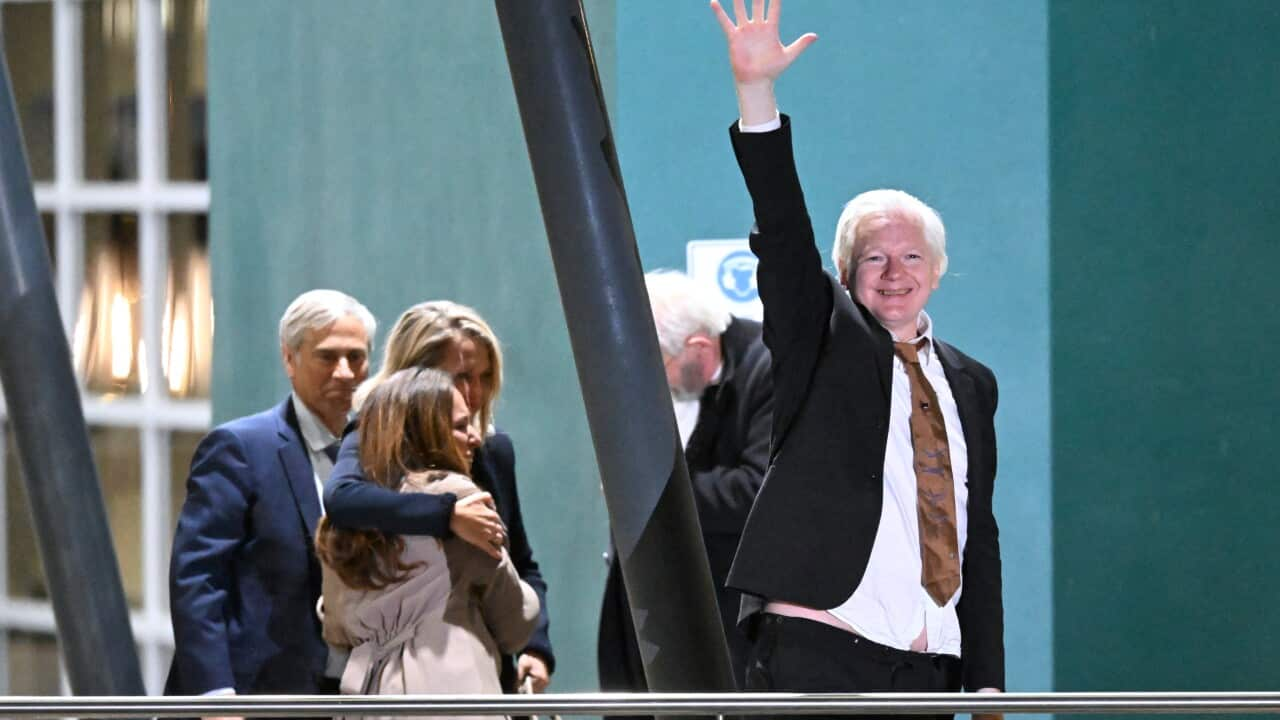Key Points
- WikiLeaks founder Julian Assange pleaded guilty to one charge in a US Court in Saipan.
- Assange has walked free out of the court room, with the judge sentencing him to time already served.
- Despite the verdict leading to Assange’s release, his legal team said his prosecution set a “dangerous precedent”.
WikiLeaks founder Julian Assange embraced his wife and father as he walked across the tarmac in Canberra, returning to his home country as a free man.
Assange had been expected to speak to the media but his wife Stella Assange said he “needed time to recuperate” and “get used to freedom,” as she thanked the Australian government and Opposition, among others who worked to secure Assange’s freedom.
Assange pleaded guilty to a US espionage criminal charge in Saipan, 14 years after he published classified military documents.
Julian Assange’s legal adviser Jennifer Robinson said Assange told Prime Minister Anthony Albanese he saved his life.
Julian Assange kisses his wife Stella Assange after arriving at Canberra Airport. Source: AAP / Lukas Coch
“This is a huge win for free speech. This is a huge win for Australia, that our Prime Minister stood up to our ally, the United States, and demanded the return of an Australian citizen. And that Julian came home today is the product of 14 long years of legal battles, political advocacy and ongoing campaigning,” she said.
Assange’s US lawyer Barry Pollack said Assange performed a “tremendous public service, not a crime.”
The saga that started with Assange holed up in Ecuador’s London embassy, before leading him to solitary confinement in Belmarsh prison in the United Kingdom, came to an end in a Pacific tropical paradise.
Assange arrived alongside his support team and Australia’s ambassador to the US Kevin Rudd at the US District Court in Saipan, the capital of the Northern Mariana Islands, just before 8am.
When court resumed after 9am, he was given his oath, introduced his full name to the court and swore to tell the truth.
Chief judge Ramona Manglona told the court that Assange was facing a charge of conspiracy to obtain and disclose national defence information.
The 52-year-old pleaded guilty to the specific charge, which is a violation of 18 USC, section 793(g) and carries a maximum penalty of up to 10 years in prison.
The US federal court accepted the guilty plea.
Speaking outside the courtroom after the verdict, Pollack confirmed that the judge determined “no additional incarceration for Mr Assange would be fair”, sentencing him to time already served in prison.
Assange spent more than five years in London’s Belmarsh prison after being incarcerated there in 2019.
Pollack said that while Assange accepted he had violated the Espionage Act, it was fundamentally flawed and inconsistent with the US Constitution’s First Amendment.
“We firmly believe that Mr Assange never should have been charged under the espionage act and engaged in an exercise that journalists engage in every day and we are thankful that they do,” he said.
Assange’s brother Gabriel Shipton told SBS World News he made many trips to the US to work with “allies” towards Assange’s release.
“Once you explain to people what is really going on and what is really at stake for them in the US they usually come to support Julian. They understand that it’s not just about him, it’s about their rights.
“This Espionage Act conviction that Julian has pleaded guilty to is actually a threat to journalists all over the world that if you publish this sort of information, the US can use their espionage act to reach into any territory in the world and charge you.”
Outside the court, Robinson, Assange’s longest-serving council member, labelled the verdict “the greatest threat to the First Amendment in the 21st century”.
“This prosecution sets a dangerous precedent that should be of concern to journalists everywhere,” she said.
“Anyone who cares about free speech and democratic accountability should stand against it. But I want to encourage everyone that stood up and fought for Julian to continue to stand up and fight against this dangerous precedent.”
What has the reaction been?
Australia had long called for the US to end its pursuit of Assange, who faced spying charges.
Prime Minister Anthony Albanese said he spoke to Assange when he landed in Canberra.
He said he had directly raised the issue with US President Joe Biden and a group of politicians from across Australia’s political spectrum converged on Washington in September to lobby US decision-makers.
“Regardless of the views that people have about Mr Assange’s activities, the case has dragged on for too long,” Albanese said.
Nationals MP Barnaby Joyce commended the “good outcome”, going as far as saying the US government had overstepped the line by trying to convict Assange.
“If you don’t break an offence in Australia, then citizenship would say there’s no threat of you being imprisoned in a third country. That’s the premise of my argument,” he told ABC News Breakfast on Wednesday.
Former US vice president Mike Pence wrote on X that the plea deal a “miscarriage of justice”.
“There should be no plea deals to avoid prison for anyone that endangers the security of our military or the national security of the United States. Ever,” he said.

